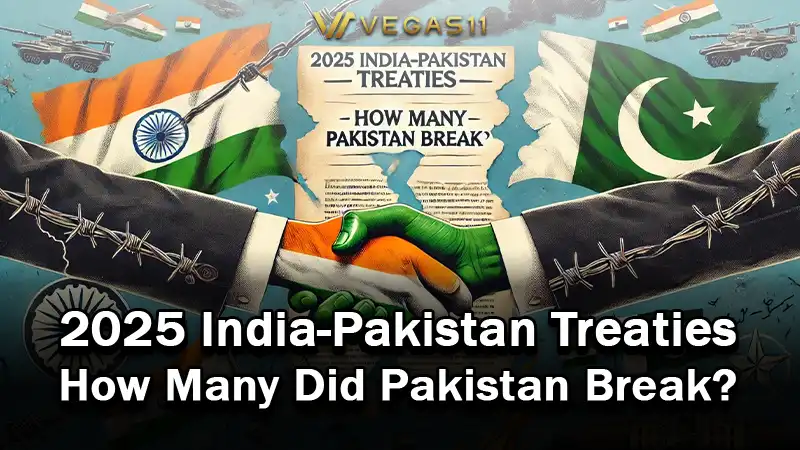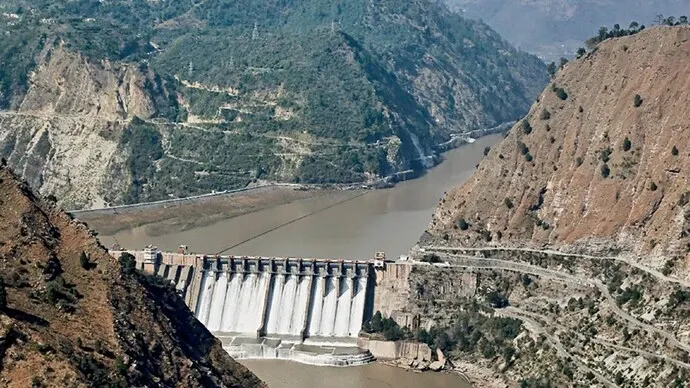
2025 India-Pakistan Treaties – How Many Did Pakistan Break?
Since the partition of India and Pakistan in 1947, the relationship between the two nations has remained on a constant edge—always just one spark away from war.
As of 2025, at least 22 major treaties have been signed between the two countries. But here's the kicker—over 70% of them were violated by Pakistan 🤬. Some were stalled, others blatantly sabotaged, and many tossed aside like they meant nothing.
Let’s break down exactly how many of these deals Pakistan has broken, including the April 23, 2025 Pahalgam terror attack 💢!
8 Key India–Pakistan Agreements
- Indian Independence Act 1947:
Marked the formal split into two sovereign nations—India and Pakistan. The British had no more say in the matter. - Ceasefire Line Agreement 1949:
Signed after the First Indo-Pak War, this agreement drew the first "Ceasefire Line" in Kashmir to mark control zones for both sides. - Indus Waters Treaty 1960:
Brokered by the World Bank, it divided six rivers—three eastern ones (Ravi, Beas, Sutlej) to India, and three western ones (Indus, Jhelum, Chenab) to Pakistan. - Tashkent Declaration 1966:
After the Second Indo-Pak War over Kashmir, the Soviet Union stepped in and got both countries to sign a peace deal in Tashkent (now in Uzbekistan). - Simla Agreement 1972:
Following Pakistan’s defeat in the 1971 war and the loss of Bangladesh, India proposed a new peace framework: resolve Kashmir bilaterally and redraw the ceasefire line—now called the "Line of Control." - Non-Nuclear Aggression Agreement 1988:
Both sides agreed not to target each other’s nuclear facilities. It took effect in 1991. - Lahore Declaration 1999:
By 1999, both India and Pakistan had nukes—so their leaders met in Lahore and promised to keep the peace.
But just a few months later, Pakistan crossed the Line of Control and kicked off the Kargil War. That declaration? Straight into the shredder 💢. - Kartarpur Corridor Agreement 2019:
A historic step for faith and diplomacy—this deal let Indian Sikhs visit a sacred site in Pakistan visa-free.
But while the intent was noble, in reality, politics kept getting in the way.
This isn’t the full list, but these treaties? They’re the ones that really mattered. And when the Pahalgam terror attack hit in April 2025, India responded hard—by putting the Indus Waters Treaty on hold.
Other Read: Karni Mata Temple: Rat Worship for Good Luck?


How Has Pakistan Violated These Agreements?
Between 1960 and 2020, India and Pakistan signed 22 major treaties. Shockingly, over 70% were violated by Pakistan—often just months after they were signed.
1. Ceasefire? What Ceasefire.
Despite multiple ceasefire agreements, Pakistan has repeatedly opened fire along the border. Between 2016 and 2022, India recorded over 7,200 violations, leading to widespread injuries and civilian deaths.
2. Water Disputes on Repeat
Under the Indus Waters Treaty (1960), both nations are supposed to share water fairly. But every time India builds a dam, Pakistan throws a tantrum—taking the matter to global forums instead of talking it out bilaterally, as the treaty requires.
3. Kartarpur Corridor: Weaponized Devotion
The Kartarpur Corridor (2019) was meant to be a symbol of peace and religious unity. Instead? It’s become a political pawn—frequently shut down by Pakistan over internal issues, disrupting the faith journeys of Indian Sikh pilgrims.
4. From Peace Talks to Battlefield
The Lahore Declaration was meant to cool tensions in 1999. But just months later, Pakistan launched the Kargil incursion. A peace pledge followed by war? Kinda speaks for itself.
5. Terror at Pahalgam
On April 22, 2025, terrorists attacked Pahalgam, killing 26 innocent tourists. The group responsible, “The Resistance Front,” has known links to Pakistan.
In response, India suspended the Indus Waters Treaty the very next day.
Important to note: India’s move wasn’t a treaty violation—it was a response to terrorism.

Other Read: Amarnath Yatra 2025 Guide: , Shiva’s Ice Cave Legend,Route Details,Register
How Would Suspending the Indus Waters Treaty Impact Pakistan?
The Indus River system is absolutely essential to Pakistan—both for farming and electricity.
Rivers like the Chenab and Jhelum are more than just waterways—they’re lifelines. So if India decides to restrict water flow under the Indus Waters Treaty, such things will haappen:
- Farmlands will dry up, ruining crops and devastating food supply chains.
- Hydropower plants will stall, plunging areas into blackouts and crippling industries.
- Food and fuel prices will skyrocket, triggering inflation.
- Unemployment will rise, especially in rural areas, as farm labor dries up.
- And as always, Pakistan will turn to international forums, accusing India of weaponizing water




